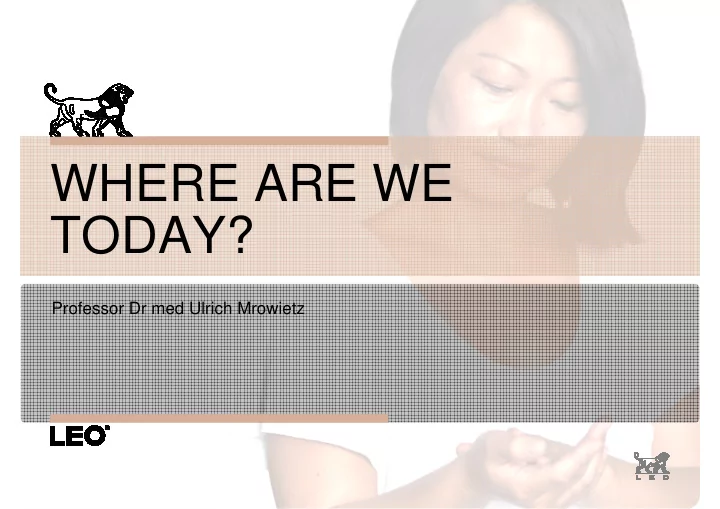

WHERE ARE WE TODAY? Professor Dr med Ulrich Mrowietz
Academy participant profile Professionals who not only get inspired but who are willing to make a difference ◦ HCPs who already have a patient empowering approach to treatment ◦ HCPs who will take responsibility in rolling out the implementation of different tools and programs to improve patient adherence and outcomes nationally ◦ HCPs who are collaborative, contributing and forward-thinking ◦ HCPs who can communicate in English
Key objectives of the Academy To enhance adherence and real-life outcomes for people living with psoriasis ◦ Support implementation of patient empowerment in daily clinical practice ◦ Disseminate tools or interventions that will help improve patient adherence (and thus patient outcomes) without increasing overall time and cost per patient ◦ Support improvement of HCP and patient communication ◦ Build a platform for a continuous communication loop with participants through interactions and support
Communication is key ◦ How we communicate information to patients about their disease and treatments is key to improving adherence: Informed and engaged Patients can be empowered patients stand a better through interaction chance of managing their and communication psoriasis effectively with their HCP ◦ The Psoriasis Academy aims to equip you to teach others about communication strategies that improve adherence ◦ The Academy will offer training, resources and processes that support HCPs to empower their patients to take control of their condition
Identifying specific adherence challenges Research identified four basic patient types in psoriasis 40% 16% Self-manager Actively engaged 28% 16% Help me Why me? Based on insights from Bewley et al. J Eur Acad Dermatol Venereol 2014;28:763–770
Understanding these patient types may benefit HCP–patient communication ◦ Grouping patients according to key behaviours and characteristics will support HCPs in their engagement with patients, helping them to: • Refer patients as necessary for psychological assessment/therapy • Provide empathy, emotional support and educational resources • To use medication more efficiently
Understanding these patient types may benefit HCP–patient communication ◦ Research indicates that patients belonging to the ‘Why me’ and ‘Help me’ profile types *: • May have a more negative relationship with their HCP • Tend to be the least satisfied with topical treatments (due to onset of action, and fear of side effects) • ‘Help me’ profile may have more concomitant conditions and have a greater propensity to anxiety, depression, insomnia and arthritis *Based on research insights (5+ years, ~6000 patients), data for 1884 of these patients published in Bewley et al. J Eur Acad Dermatol Venereol 2014;28:763–770
Understanding these patient types may benefit HCP–patient communication ◦ A good HCP–patient relationship and inclusion of patients in therapy decisions (joint planning approach) may help to improve treatment adherence and patient satisfaction 1,2 ◦ This requires sufficient time at each visit to explain the use, benefits and possible side effects of medications 1. Augustin et al. Dermatology 2011;222:363−374; 2. Umar et al. J Eur Acad Dermatol Venereol 2013;27:763−770
HCP–patient interactions Expectations/understanding influence treatment adherence Differences in HCP and patient expectations/ understanding are: o Treatment goals o Need for education o Content and quality of first visit o Importance of maintenance treatment Uhlenhake et al. J Dermatolog Treat 2010;21:6–12
HCP–patient interactions Expectations/understanding influence treatment adherence Improving the HCP–patient relationship can improve medication adherence: 1,2 o A patient’s trust in a HCP is linked with effective communication o Trust can be increased if HCPs: • Show patients they understand the burden of their illness • Listen to patients’ concerns • Physically examine patients’ skin 1. Feldman et al. J Am Acad Dermatol 2008;59:1009–1016; 2. Feldman SR. J Drugs Dermatol 2010;9:908–911
Summary (1) ◦ Treatment adherence is recognised as a specific challenge to the effective treatment of inflammatory skin conditions such as psoriasis ◦ Non-adherence to treatment is associated with poor clinical outcomes, may foster inappropriate therapeutic decisions and can result in increased healthcare costs
Summary (2) ◦ There are many reasons for patients not adhering to treatment, both intentional and non-intentional: Social and HCP and economic system related Patient related Treatment Disease related related
National roll-outs Reaching over 1600 healthcare professionals Delegates from 29 Most countries have >20 countries have countries attended held or are planning held national academy the 3 regional their faculty meetings workshops Academies
Recommend
More recommend